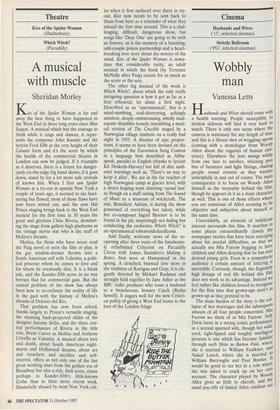Theatre
Kiss of the Spider Woman (Shaftesbury) Which Witch? (Piccadilly)
A musical with muscle
Sheridan Morley
Kiss of the Spider Woman is far and away the best thing to have happened to the West End in three long years since Miss Saigon. A musical which has the courage to think while it sings and dances, it repre- sents the composer John Kander and the lyricist Fred Ebb at the very height of their Cabaret form and it's the score by which the health of the commercial theatre in London can now be judged. If it triumphs as it deserves, there is a future for danger- ously on-the-edge big band shows; if it goes down, stand by for a lot more safe revivals of known hits. When I first saw Spider Woman at a try-out in upstate New York a couple of years ago, it seemed to me fasci- nating but flawed; most of those flaws have now been sorted out, and the new Hal Prince staging brings back to the West End musical for the first time in 30 years the great and glorious Chita Rivera, dominat- ing the stage from gallery-high platforms as the vintage movie star who is the stuff of Molina's dreams.
Molina, for those who have never read the Puig novel or seen the film or play, is the gay window-dresser thrown into a South American cell with Valentin, a polit- ical prisoner whom he comes to love and for whom he eventually dies. It is a bleak tale, and the Kander-Ebb score in no way betrays that for commercial gain. But the central problem of the show has always been how to co-ordinate the reality of life in the gaol with the fantasy of Molina's dreams of Dolores del Rio.
That problem has now been solved, thanks largely to Prince's versatile staging, the stunning back-projected slides of the designer Jerome Sirlin, and the three cen- tral performances of Rivera in the title role, Brent Carver as Molina and Anthony Crivello as Valentin. A musical about love and death, about South American night- mares and Hollywood dreams, about sex and treachery and sacrifice and self- interest, offers us not only one of the last great working stars from the golden era of Broadway but also a rich, dark score, closer perhaps to Kander-Ebb's little-known Zorba than to their more recent work. Shamefully abused by most New York crit- ics when it first surfaced over there in try- out, Kiss now needs to be sent back to them from here as a reminder of what they missed the first time around. This is a chal- lenging, difficult, dangerous show, but songs like 'Dear One' are going to be with us forever, as is the memory of a haunting, odd-couple prison partnership and a heart- breaking love story about the movies of the mind. Kiss of the Spider Woman is nowa- days that considerable rarity, an adult musical in which the book (by Terrence McNally after Puig) counts for as much as the score or the sets.
The other big musical of the week is Which Witch?, about which the only really intriguing question is how it got as far as a first rehearsal, let alone a first night. Described as an `operamusical', this is a mind-numbing, soul-destroying, achingly amateur, deeply embarrassing, wholly inad- equate shambles loosely resembling a musi- cal version of The Crucible staged by a Norwegian village institute on a really bad night in 1955. A disaster of epic propor- tions, it seems to have been devised on the principles of the Eurovision Song Contest in a language best described as Abba- speak, parallel to English (thanks to lyricist Kit Hesketh-Harvey) but full of dire audi- ence warnings such as, 'There's no way to keep it alive'. We are in the far reaches of high Norwegian camp at glacier level, with a dozen leaping nuns chanting 'carnal lust' as though on a staff outing from The Sound of Music to a museum of witchcraft. The star, Benedicte Adrian, is during the show possessed of everything but talent, while her co-composer Ingrid Bjornov is to be found in the pit, surprisingly not hiding but conducting the orchestra. Which Witch? is an operamusical tobeavoidedatallcosts.
And finally, welcome news of the re- opening after three years of the handsome- ly refurbished Criterion on Piccadilly Circus with James Saunders's Making it Better, first seen at Hampstead in the spring. A clenched, bisexual love story in the tradition of Rattigan and Gray, it is ele- gantly directed by Michael Rudman and strongly held together by Jane Asher as the BBC radio producer who loses a husband to a treacherous, bouncy Czech (Rufus Sewell). It augurs well for the new Criteri- on policy of giving a West End home to the best of the London fringe.


























































 Previous page
Previous page